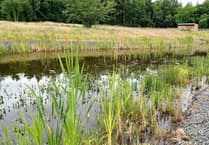JOB losses and the closure of the award-winning visitor centre at Princetown are among proposed cuts by the Dartmoor National Park Authority as it faces a £500,000 deficit.
Dr Kevin Bishop, chief executive of the authority, confirmed the news on Tuesday.
He said staff were currently being consulted on redundancies, but could not say how many jobs were at risk.
‘The current Medium Term Financial Plan indicates that we face a financial deficit of circa £500,000 over the period 2022/23 – 2024/25. The planned redundancies that we are currently consulting with staff will address the £500,000 deficit. They do not address any further cuts that may result from the Autumn Statement due later in November 2022.
‘Current pressures leave us no choice but to look at how we reduce costs,’ said Dr Bishop in an exclusive interview with the Times’ sister paper the Mid Devon Advertiser on Tuesday. ‘We are legally required to set a “balanced budget”.’
‘The proposal to close our award-winning National Park Visitor Centre at Princetown is not taken lightly.
‘We are very proud of the service it delivers to around 80,000 visitors each year.
‘We know that its closure will impact on people’s enjoyment of the national park and on the local economy.
‘We are also concerned about the impact it will have on education – it is an important resource for school groups. However, the scale of the financial deficit necessitates hard decisions; we can’t see any ready alternatives to this closure.
‘The changes proposed do not mean that those service areas, or staff, are failing or not important.
‘The proposals outlined in this paper are borne of necessity, proposed with a heavy heart and in the knowledge that they will have a profound impact on staff – our number one asset and mechanism to deliver national park purposes.
‘Our proposals are being consulted on with staff currently. The final decision will be made early in the New Year on what cuts will be made to ensure we set a balanced budget for 2023/24.’
He added: ‘The authority faces a significant financial challenge over the next few years; in summary our core grant is forecast to remain static, yet our costs are increasing significantly and our ability to generate commercial income is limited.
‘The Government is expecting us to absorb increased costs (eg staff pay award, fuel, utility, contractor and material costs) from our existing grant.
‘The authority’s single most important source of income is the National Park Grant. We receive this from the Department for the Environment, Food and Rural Affairs (Defra) – our “sponsoring’”department.
‘National Park Grant has remained static since 2020/21 and the outcome of the 2021 Spending Review is that it is indicated to remain static until 2024/25 – six years of a fixed income (£3.8m).
‘We have, through careful budget management, “lived with” flat cash when inflation has been low; flat cash when inflation is high and increasing is a different scale of challenge.’
The Guardian has reported that all of England’s national parks are facing a funding crisis that is forcing them to make plans to close visitor centres, make park rangers redundant, stop maintaining paths and introduce other cuts, in an effort to balance their budgets, according to the latest figures.
Funding has fallen by 40 per cent in real terms over the last decade, and grants are expected to flatline until 2025 despite rising wage bills and costs. Government funding for national parks has been frozen since last year. Data compiled by National Parks England suggests the country’s 10 park authorities will have to make cuts of £16 million over the next three years.
A Department for Environment, Food and Rural Affairs spokesperson said: ‘We understand the very challenging financial circumstances currently facing all sectors and the pressures that this is putting on our national park authorities in particular.
‘We remain committed to supporting our national park authorities and are working with them to identify additional sources of funding, particularly through private investment.’




